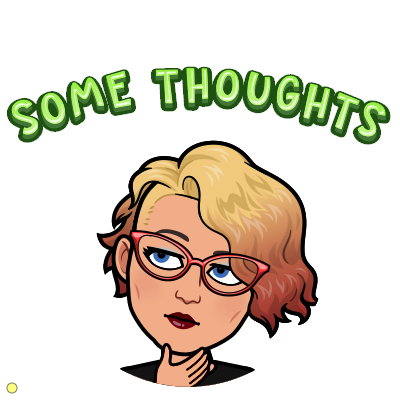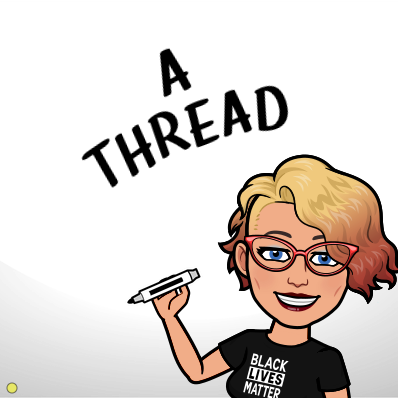This morning, I woke up to a response to my Twitter thread from yesterday. The poster expressed frustration with my position that teachers need a week without students in order to properly prepare (see linked thread for my perspective)
While the tone of their question was quite aggressive (it ended with the single word, "Shame"), the content of the post inspired me to do some more writing. I'm sure there are others out there with similar questions about what teachers have done to be proactive about the return to school. I did quite a bit of barbecuing, but I'm sure that's not what people want to hear...

I present to you, What I Did This Summer (originally posted as a response thread on Twitter) :
1/ Hi, _________, thank you for the question regarding how I have been using my time since classes officially ended on June 5th. I would love to be able to address you by name, and to know a bit about your context if you are interested in sharing.
2/ So much of the work I do is not public-facing, it is reasonable to ask what I've been up to. Thank you for providing me the opportunity to share what the past 10 weeks have looked like for me!
3/ I did not stop interacting with my Ss on June 5th, (the last official day of online classes). Up until June 12th, many teachers (including myself) were providing feedback on assignments, and answering questions from parents and students about the transition to the next grade.
4/ For my part, beyond June 12th, I continued to meet with a small group every day to complete a book we had begun reading together. Those daily meetings concluded on June 26th. We read “Fish in a Tree”, which is an engaging book about a student newly diagnosed with dyslexia.
5/ After June 30th, the day of our final staff meeting for the school year, I took a break for a week. I read some books, watched @HamiltonMusical, and tried to shut my brain off. It was challenging!
6/ On July 7th I attended a webinar entitled “So you want to do ABAR work?”, put on by four incredible educators @sheathescholar @teachntransform @mochamomma & @MsKass1. I paid for this webinar out of pocket, and was more than happy to compensate these folx for their labour.
7/ Starting on July 6th, I was enrolled in the @AMLE Back to School Camp - an online conference for middle school educators looking to be proactive in planning for a return to classes (in person, online, or a hybrid model) Nine other educators from my school attended as well.
8/ The first week of “camp” involved getting to know some of my fellow attendees, and planning which sessions I wanted to attend live, and which ones to watch “on demand” later.
9/ July 9th, as part of the online camp experience, I attended a 90 minute Q&A session with @desautels_phd on the neuroscience behind having a trauma-informed lens when interacting with middle school students.
10/ July 14-16 at camp were jam-packed with sessions from 12pm - 6pm each day, with the opportunity to watch video of sessions that were scheduled concurrently. I attended as many sessions as I could fit in, and have watched many of the ones I missed.
11/ On July 17th, @rickwormeli2 ran a Q&A as a follow-up to his presentation earlier that week. He covered a wide range of topics surrounding assessment of student learning, bridging gaps in learning & addressing concerns about cheating in online learning environments.
12/ The team of Ts from my school met to debrief the sessions, and to discuss how to share our learnings with other staff when we returned to work in Sept. The 10 of us represent about a third of the staff (teachers, educational assistants, custodian, library tech) at our school.
13/ The week of July 20th, I began work on an online course which will be part of my MEd in School Counselling. I worked 3 hours per day on reading the provided materials, searching for supplemental articles, writing papers and engaging in a discussion forum with other students.
14/ I finished my final paper for that course this morning. It was a priority for me to finish it before returning to school, so that my attention wouldn't be divided. I'm glad I was able to meet my self-imposed deadline!
15/ July 23rd, the team of teachers from my school who attended the @amle camp met with @wmspal to discuss ways we could work to improve positive relationships at our school. His insights were very helpful, and we are working on some plans for implementation in our building.
16/ The week of July 27th, I experienced enough symptoms of Covid-19 that I called 811. I was instructed to self-isolate while waiting to be tested, and then for results. Within 4 days, I had a test done and it came back negative, which was a huge relief.
17/ I am grateful to our health care system that the turnaround was only four days, and felt fortunate that I was on vacation and therefore did not need to take time off work in order to comply with NSHA requirements.
18/ Aug 13, I paid to attend a fantastic webinar with @alexsvenet on a trauma-informed return to school. She outlined 1 major concern for each of the models of instruction (in-person, online, or hybrid) as there were educators from all scenarios attending. Well worth the money!
19/ Next week, I will be attending 3 online sessions offered by the @avrce_ns : Moving Forward in Mathematics; 7-8 PBL/Inquiry; and 7-8 Curriculum Renewal. I will also take part in a follow-up session with @AMLE. The following week, I return to the school building.
20/ When I say I am not fully ready to greet students on Sept 8, it has very little to do with what I have or have not done while on vacation.
21/21 Are there teachers who did not do the things that I have mentioned? Sure. This is our vacation time, I do not begrudge people taking a break. Are there Ts who did more than me? Absolutely. Thanks again for giving me the opportunity to share what I've been up to this summer.


































